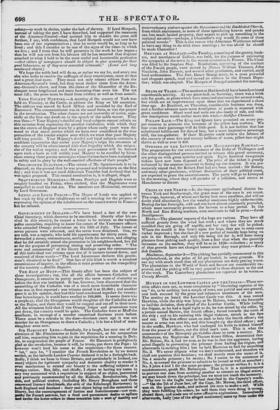THE RIOT AT MUFF.-.--This bloody affair has been the subject
of three investigations ; but, like all the affairs between Catholics and Orangemen, it remains in pretty nearly the same state of obscurity as before the first was instituted. It has, however, been discovered that the assembling of the Catholics was of a much more formidable character than was at first reported : one witness stated it at 25,000; and another gave it as his opinion, that had this band continued together for twenty- four hours longer, it would have swelled to 100,000. It seems there was a prophecy, thai the Orangemen would slaughter all the Catholics as far as the Boyne, and there they would be stopped and cut off in their turn. All the witnesses held that if the Orange lodges and processions were put down, the country would be quiet. The Catholics were at Muff the assailants, in revenge of a murder committed fourteen years before. There must be a mistake in the date—fourteen years ago it was not murder for an Orangeman to shoot a Catholic ; it is but a kind of man- slaughter even now.
SIR HARCOURT LEES.—Somebody, for a laugh, has sent one of the Circulars of Mr. Fitzsimmons to little Sir Harcourt, as his compatriots call him, requesting him to join in the requisition for a meeting in Dub- lin, to congratulate the people of France. Sir Harcourt is prodigiously glad at the revolution, because it will, he trusts, put down the Pope : he however won't lend his name to the requisition—for three reasons. "1st," says he, "I consider the French Revolution as by no means settled, as the imbecile London Courier declared it to be a fortnight back. 2ndly, I think we have in Great Britain, and particularly in Ireland, too many objects for legitimate sympathy and domestic charity to render it even meritorious to extend our bounty to the suffering subjects of a foreign nation. But, 3dly, and chiefly, I object to having my name in any way connected with a requisition in support of an object, patronised and previously recommended by all the Radicals, Revolutionists, Infi- dels, and political traders, (including Mr. Henry Brougham and those renowned literary blockheads, the elite of the Edinburgh Reviewers) in both England and Scotland : their real object being not the extension of liberty, but the encouragement of faction and licentiousness—not sym- pathy for French patriots, but a fond and paramount desire to agitate and excite the lower orders in these countries into a state of hostility and insurrectionary violence against the Government and the Etta' (dished Church, from which excitement, as none of these speculating knaves and quacks can lose much landed property, they expect to pick up something in the national scramble—perhaps, a Chancellor's wig would fit some of these political vermin." This is the reason why Alderman Waithman refused to have any thing to do with these meetings ; he was afraid he should be made Chancellor !
MEETING AT BELFAST.—On Tuesday, a meeting of the gentry, bank- ers, and merchants of Belfast, was held, for the purpose of expressing the sympathy of the town in the recent revolution in France. The Chair was filled by Sir Stephen May. Resolutions, approving of the conduct of the French people, were moved by Messrs. William Tennant, John Sinclaire, John Barnett, and several other gentlemen, and carried, amid loud acclartrations. The Rev. Henry itiontgemery, in a most powerful and eloquent speech, read and moved an address to the French Depu- ties; which was adopted. The Marquis of Donegal attended the meeting.


























 Previous page
Previous page